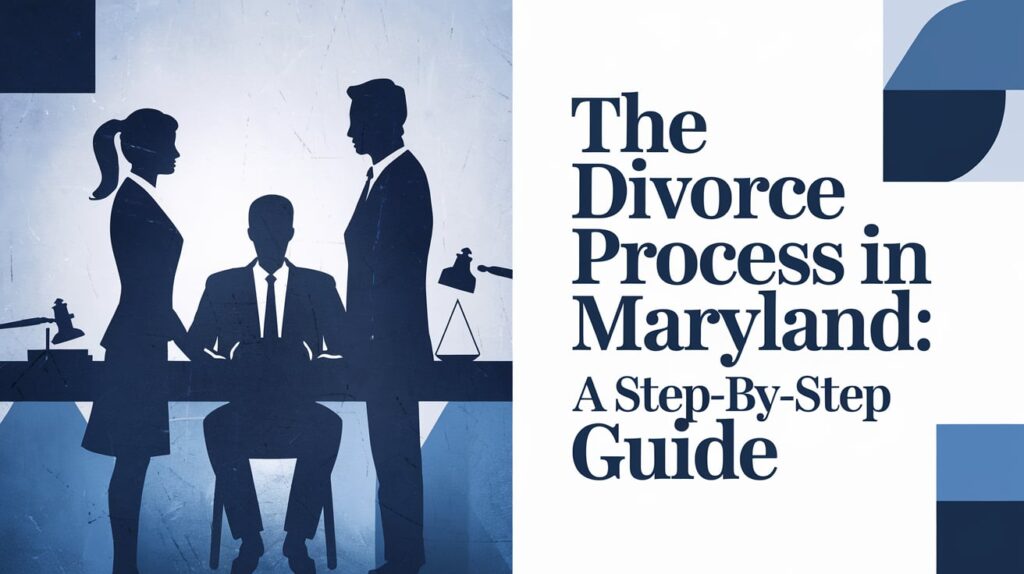Navigating a divorce can be a complex and emotionally challenging journey. Understanding the legal process can help you feel more in control and better prepared for each stage. This comprehensive guide outlines the step-by-step process of divorce in Maryland, providing you with the knowledge you need to navigate this difficult transition more smoothly.

Step 1: Filing for Divorce
The first formal step in the Maryland divorce process is filing for divorce. This involves several key components:
Legal Grounds
The grounds for divorce in Maryland include:
Initial Paperwork
To initiate the divorce process, you’ll need to file several documents with the court:
Filing Requirements
To file for divorce in Maryland, at least one spouse must be a resident of the state. If the grounds for divorce occurred outside Maryland, at least one spouse must have resided in Maryland for at least six months before filing.
You should file in the circuit court of the county where either you or your spouse resides.
Step 2: Serving the Spouse
After filing, you must legally inform your spouse of the divorce action. This is known as “service of process.”
Process Service
There are several methods to serve divorce papers in Maryland:
Proof of Service
Once your spouse has been served, you must file proof of service with the court. This is crucial, as the court cannot proceed without confirmation that your spouse has been notified. Proof of service is an Affidavit of Service completed by whomever completes the service.
Step 3: Response and Counterclaim
Your spouse has 30 days (60 days if they live out of state) from the date of service of the Complaint and Summons to respond to the divorce complaint.
Spouse’s Response
Your spouse can:
Counterclaim
Your spouse may also file a counterclaim, essentially filing their own divorce complaint. This allows them to state their own grounds for divorce and requests for relief.
Step 4: Discovery Phase
The discovery phase is crucial for gathering information to support your case.
Information Gathering
Through discovery, parties exchange financial information, including:
Depositions and Interrogatories
Depositions involve sworn out-of-court testimony. Interrogatories are written questions that must be answered by a party under oath. Both can be used to gather information and clarify facts.
Document Requests
You can formally request specific documents from your spouse. This might include tax returns, business records, or communications relevant to the divorce.
Step 5: Negotiation and Settlement
Many divorces in Maryland are settled out of court through negotiation or alternative dispute resolution methods.
Mediation and Collaborative Divorce
Mediation involves a neutral third party helping spouses reach an agreement. Collaborative divorce involves a team approach, with each spouse having their own attorney and agreeing to settle out of court.
These methods can be less adversarial and more cost-effective than going to trial.
Settlement Agreement
If you reach an agreement, your attorneys will draft a settlement agreement covering all aspects of your divorce, including:
Court Approval
Once signed, the settlement agreement is submitted to the court for approval. If the judge finds it fair and in the best interest of any children involved, it will be incorporated into the final divorce decree.
Step 6: Trial and Judgment
If you can’t reach a settlement, your case will go to trial.
Court Proceedings
During the trial:
Final Judgment
After the trial, the judge will issue a final judgment, detailing decisions on all contested issues. This becomes your final divorce decree.
Step 7: Post-Divorce Considerations
Even after the divorce is finalized, there may be ongoing legal matters to address.
Enforcement
If your ex-spouse doesn’t comply with the divorce decree, you may need to return to court for enforcement. This might involve wage garnishment for unpaid support or contempt proceedings for violation of custody orders.
Modifications
If circumstances change materially, you can petition the court to modify certain aspects of the divorce decree, such as child support, custody arrangements, or alimony.
Appeals
If you believe the judge made a legal error in your case, you have 30 days from the date of the final judgment to file an appeal.
Understanding the divorce process in Maryland can help you approach this challenging time with more confidence and clarity. Remember, each divorce is unique, and the process may vary depending on your specific circumstances.
While this guide provides a general overview, navigating a divorce often requires expert legal guidance. At Cynthia H. Clark and Associates, we have extensive experience guiding clients through every step of the Maryland divorce process. Our team can provide the personalized support and skilled representation you need to protect your interests and achieve the best possible outcome.
Don’t face this complex process alone. Contact Cynthia H. Clark and Associates today to schedule a consultation and learn how we can assist you in your Maryland divorce case. Let us help you move forward with confidence towards the next chapter of your life.
